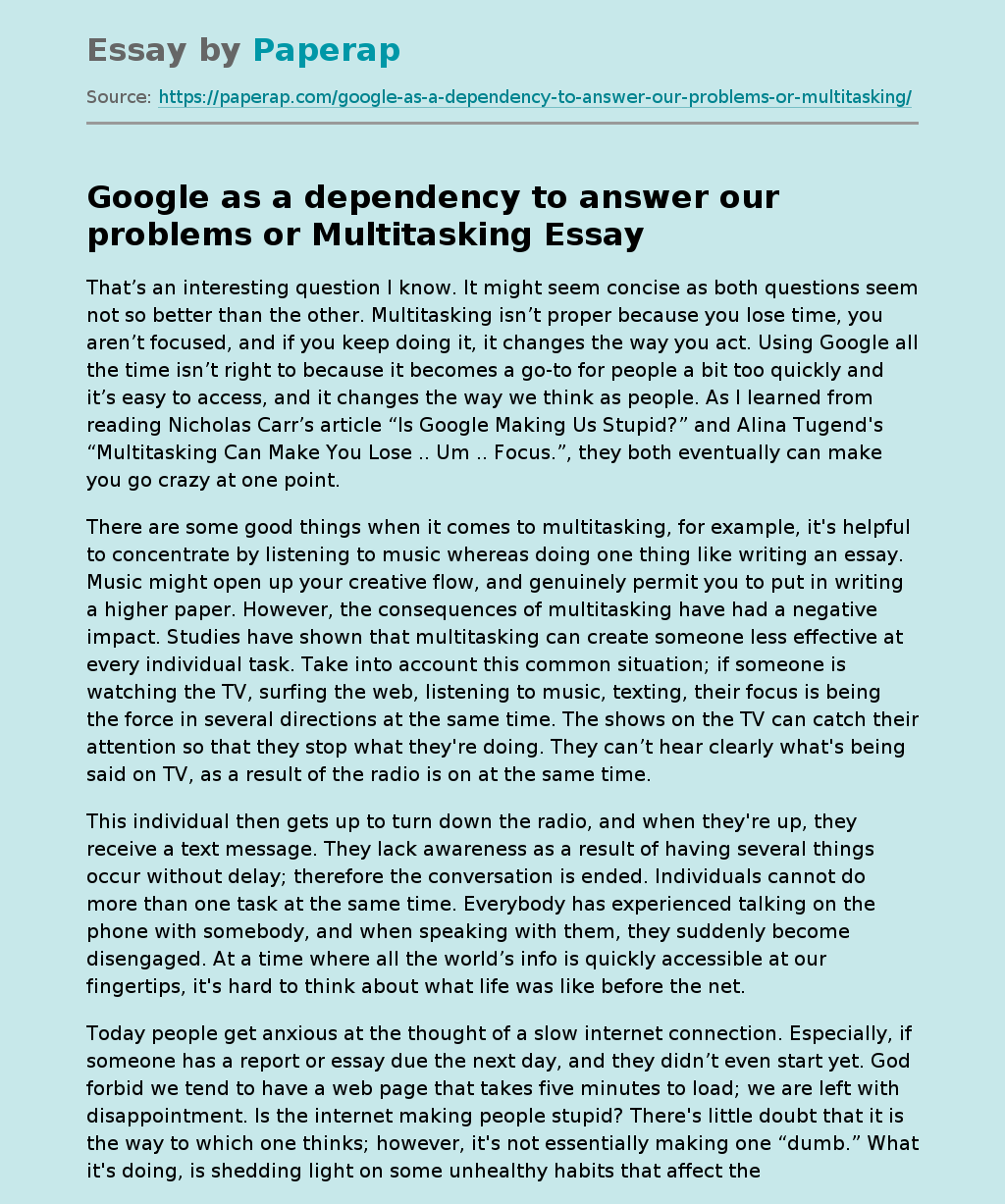Google as a dependency to answer our problems or Multitasking
That’s an interesting question I know. It might seem concise as both questions seem not so better than the other. Multitasking isn’t proper because you lose time, you aren’t focused, and if you keep doing it, it changes the way you act. Using Google all the time isn’t right to because it becomes a go-to for people a bit too quickly and it’s easy to access, and it changes the way we think as people. As I learned from reading Nicholas Carr’s article “Is Google Making Us Stupid?” and Alina Tugend’s “Multitasking Can Make You Lose .
. Um .. Focus.”, they both eventually can make you go crazy at one point.
There are some good things when it comes to multitasking, for example, it’s helpful to concentrate by listening to music whereas doing one thing like writing an essay. Music might open up your creative flow, and genuinely permit you to put in writing a higher paper.
However, the consequences of multitasking have had a negative impact. Studies have shown that multitasking can create someone less effective at every individual task. Take into account this common situation; if someone is watching the TV, surfing the web, listening to music, texting, their focus is being the force in several directions at the same time.
The shows on the TV can catch their attention so that they stop what they’re doing. They can’t hear clearly what’s being said on TV, as a result of the radio is on at the same time.
This individual then gets up to turn down the radio, and when they’re up, they receive a text message. They lack awareness as a result of having several things occur without delay; therefore the conversation is ended. Individuals cannot do more than one task at the same time. Everybody has experienced talking on the phone with somebody, and when speaking with them, they suddenly become disengaged. At a time where all the world’s info is quickly accessible at our fingertips, it’s hard to think about what life was like before the net.
Today people get anxious at the thought of a slow internet connection. Especially, if someone has a report or essay due the next day, and they didn’t even start yet. God forbid we tend to have a web page that takes five minutes to load; we are left with disappointment. Is the internet making people stupid? There’s little doubt that it is the way to which one thinks; however, it’s not essentially making one “dumb.” What it’s doing, is shedding light on some unhealthy habits that affect the way we take information in.
We get anxious if we have to pay quite some time searching for one thing. The web has praised this type of mentality with games just like the Wiki Race. This game glorifies finding data as quickly as potential with as minimal effort as possible. The consequence of this can be that faster isn’t always better. As a result, we’ve additionally become inefficient researchers. Though Wikipedia is frowned upon within the educational world, that doesn’t stop people from using it to find specific data. In educational settings, research should be done in-depth; however, the net has made it difficult to stay focused.
In agreement with Author Nicholas Carr, of “Is Google Making Us Stupid?” within the sense that I too, cannot stay focused once reading long articles online. I get anxious after a reading few pages because I’m attempting to find the main point and find myself skimming the data. We tend to always search for information all the time. We try to be useful with our time; however, we tend to find ourselves having unhealthy habits that make us seem “dumb” to older generations. Once reading an article, I do know there are words that I’ve got to look up, that typically lead ME in a completely different direction. I will assure you that after twenty minutes I’ll have forgotten what I used to be initially looking up thanks to the handful of tabs I’ll have open. If multitasking is the way we do carry out many tasks, it’d be a shock that some people are good at it.
A notable media multitasking study found that heavy multitaskers are more likely to have distractions and be worse at task-switching effectively. This is smart if you think about multitasking to be ‘the art of paying attention.’ Serious multitaskers roll out the mat for each new distraction, after all, they cannot pay attention to things. The focus is not their intent. Attention is very important, and lightweight multitaskers could be better at saving their ti. The result is that it’s pointless to mention that one form of person is better at multitasking, and another isn’t. Instead, there’s a limited supply of this issue called attention, and a million ways in which to divide, manage, and preserve it. For a few people, a state of deep focus is called office nirvana. For others, distraction is a necessity. Whichever way works out for you.
Google as a dependency to answer our problems or Multitasking. (2021, Dec 03). Retrieved from https://paperap.com/google-as-a-dependency-to-answer-our-problems-or-multitasking/

